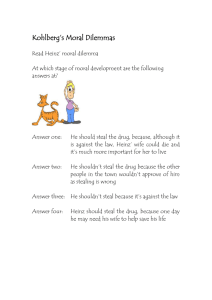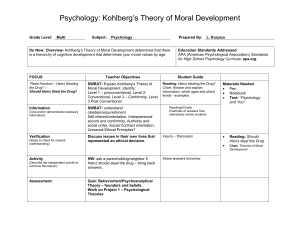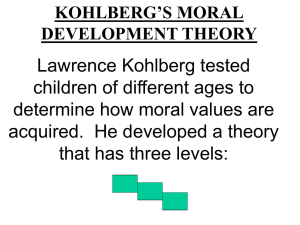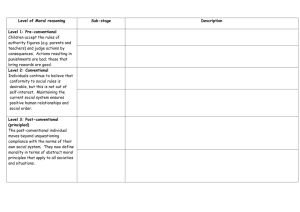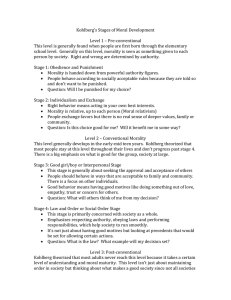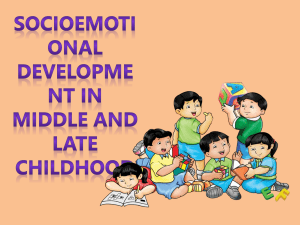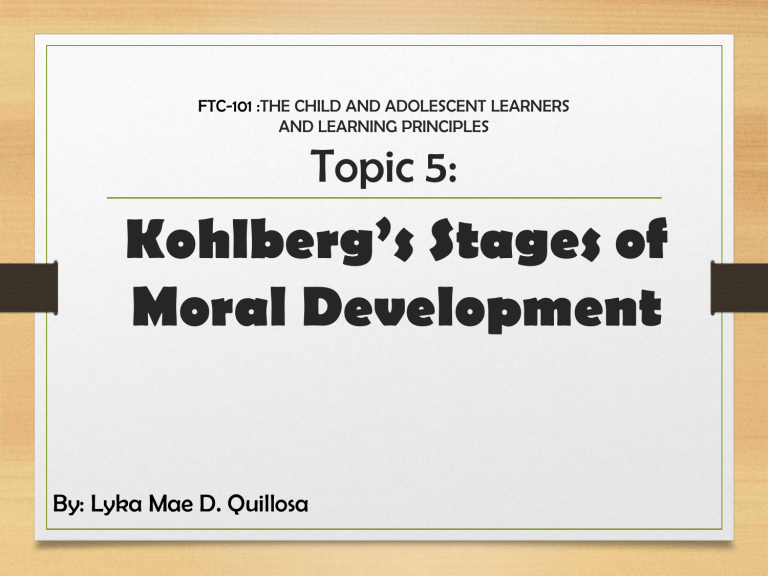
FTC-101 :THE CHILD AND ADOLESCENT LEARNERS AND LEARNING PRINCIPLES Topic 5: Kohlberg’s Stages of Moral Development By: Lyka Mae D. Quillosa https://prayerforonlineclass.com/class-opening-prayer-ten-short-prayers-to-start-the-day/ MOTIVATIONAL TIME! OBJECTIVES 1. Students will able to differentiate/categorize the level and stages of moral development theorized by Kohlberg. 2. Students will able to articulate the moral justifications for the moral choice/decision for the presented moral dilemmas. Lawrence Kohlberg 1927-1987 http://relong.myweb.uga.edu/ Jean Piaget 1896-1980 Heinz Dilemma The Heinz dilemma is a moral question proposed by Kohlberg in his studies on moral development. It involves a man named Heinz who considers stealing a drug he cannot afford to save his dying wife, prompting discussion on the moral implications and justifications of his potential actions. https://www.simplypsychology.org/kohlberg.html#:~:text=The%20Heinz%20dile mma%20is%20a,justifications%20of%20his%20potential%20actions. # Question: If you are Heinz? What would you do? OPTIONS: 1. Heinz should not steal the medicine because he will be punished and go to jail. 2. Heinz should steal the medicine for him to be happy and so his wife will also feel better. 3. Heinz should steal medicine because he is a good and loving husband and his wife expects him to do that for him. 4. Heinz should steal the medicine and its okay for him to go to jail because he abide the law. 5. Heinz should steal the medicine because it is more important to save a life than following the rules/law. 6. Heinz should steal the medicine but it is not fair for him to go to jail and be punished in saving a life 3 LEVELS OF MORAL REASONING Pre-conventional Morality • Stage 1: Obedience and Punishment • Stage 2: Individualism and Exchange Conventional Morality • Stage 3: Interpersonal Relationships • Stage 4: Maintaining Social Order • Post-conventional Morality Stage 5: Social Contract & Individual Rights • Stage 6: Universal Principles Level 1: Preconventional Morality Stage one: Obedience and Punishment Orientation • Knowledge of set rules • Recognize and follow authority • Concerned with consequences and punishment • Preconventional thinking “Heinz should not steal the medicine because he will be punished and go to jail.” Stage two: Individualism and Exchange • Isolated - individual way of thinking • Start to realize that there is more than one “right way” of doing things • Minimally appreciate different viewpoints • Only does something to get something http://static.photaki.com/isolated--kid--hands-up-458489.jpg “Heinz should steal the medicine for him to be happy and so his wife will also feel better.“ Level two: Conventional Morality Stage three: Good Interpersonal Relationships • Expectations of one’s family & community are extremely important • What society expects as “good” behavior • Need for approval of peers “Heinz should steal medicine because he is a good and loving husband and his wife expects him to do that for him.” Stage four: Maintaining the Social Order • Makes moral decisions based on society • Maintaining social order • Obeying laws because it’s what makes society function properly http://www.ideachampions.com/weblogs/archives/2010/03/a_good_decision.shtml “Heinz should steal the medicine and its okay for him to go to jail because he abide the law.“ Level three: Post conventional Morality Stage five: Social Contract and Individual Rights • Think about society in a theoretical way • Rights and values of societies are more important than self • See changes can be made to rules to benefit their society • Right actions can be a matter of personal values and opinions “Heinz should steal the medicine because it is more important to save a life than following the rules/law.“ Stage six: Universal Principles • • • • Make decisions based on their conscience Self-ethics – what’s right for all Believe in fairness and justice Make sure everyone benefits and no one is left out or hurt / “Heinz should steal the medicine but it is not fair for him to go to jail and be punished in saving a life.” Summary of the six stages • Stage one: right & wrong • Stage two: see everyone has their own opinions and there is more than one right side • Stage three: being a good person in society • Stage four: obeying laws to maintain good society • Stage five: basic rights of individuals • Stage six: equality for all “Just Community” Schools Approach • Democratic community with full participation • Small size • Students entrusted with responsibility • Consensus rather than “majority rules” • Teacher acts as moderator Conclusion • Stages are logical • “Just Community” schools approach seems a little idealistic • Moral education can be controversial • Teachers can have daily/weekly discussion groups • Parents can talk with their kids about issues instead of jumping to discipline It seems obvious that moral stages must primarily be the products of the child's interaction with others rather than the direct unfolding of biological or neurological structures. - Lawrence Kohlberg - Lets test your understanding: • At the pre-conventional level, what characterizes the child’s reasoning? • At the conventional level, what characterizes the child’s reasoning? • At the post-conventional level, what characterizes the child’s reasoning? • What is the role of a teacher in the “just community” schools approach? • What are ways you can promote moral development in children? THANK YOU FOR LISTENING Citations • • • • • • • • • • • • • • • • • • Crain, W C. “Kohlberg’s Stages of Moral Development.” plts. N.p., n.d. Web. 14 Sept. 2011. <http://faculty.plts.edu/gpence/html/kohlberg.html>. Kohlberg, By Lawrence. “Stages of Moral Development.” NSS Press . N.p., n.d. Web. 15 Sept. 2011. <http://www.nsspress.com/braunwarth_reader/sec2-01.htm>. Kohlberg, Lawrence. “Lawrence Kohlberg Quotes.” Brainy Quote. N.p., 2001-2011. Web. 14 Sept. 2011. <http://www.brainyquote.com/quotes/authors/l/lawrence_kohlberg.html>. “Kohlberg’s Stages of Moral Development.” University of Central Florida. N.p., 9 June 2011. Web. 15 Sept. 2011. <http://pegasus.cc.ucf.edu/~ncoverst/Kohlberg’s%20Stages%20of%20Moral%20Development.htm>. Long, Robyn, and Roger Thomas. “Lawrence Kohlberg 1927- 1987.” Uga. N.p., n.d. Web. 14 Sept. 2011. <http://relong.myweb.uga.edu>. Nucci, Larry. “Moral Development and Moral Education: An Overview.” University of Illinois at Chicago. N.p., 2 Dec. 2008. Web. 15 Sept. 2011. <http://tigger.uic.edu/~lnucci/MoralEd/overview.html>. http://www.education.com/reference/article/kohlberg-lawrence-1927-1987/ http://www.deborahshanetoolbox.com/wp-content/uploads/2010/05/golden-rule.jpg http://www.legendsofamerica.com/nm-truthconsequence.html http://han-liang.blogspot.com/2011/03/kohlbergs-stages-of-moral-development.html http://math.pppst.com/problemsolving.html http://10.104.1.249/block/restricted.html?fn=HS&fp=6&ip=10.161.142.145&ibip=10.104.1.229&ldu=0&re=0&bu=funyug.com/wpcontent/uploads/2011/06/animatedthinkingcap.gif&bc=Website%20contains%20prohibited%20Friendship%20content. http://how-to-keep.net/wp-content/uploads/2011/02/how-to-keep-family-bonds.jpg http://www.ehow.co.uk/how_4732368_reward-good-behavior-children-food.html http://www.rollbackcampaign.org/images/areas/143/NCRCR%20Equality%20Logo%20wLtrsCROPPED.gif http://www.naswil.org/news/networker/featured/self-care-an-ethical-responsibility http://www.visualphotos.com/image/2x1899177/schoolchildren_sitting_in_a_circle https://www.scribd.com/document/411599815/Stages-of-Moral-Development-2#
